The relentless quest for a dog toy that truly lasts can feel like an endless battle for many dog owners. You pick out a promising new toy, envisioning hours of joyful play, only to find it in pieces within minutes, or even seconds. This frustrating cycle is all too familiar for those living with what we affectionately call “power chewers” – dogs that chew everything in their path. Here at Dog Care Story, and especially at our affiliated Benafim Dog Shelter, we understand this challenge intimately. Our shelter dogs, with their diverse breeds and powerful chewing styles, serve as our ultimate product testers, giving us real-world insights into which toys can actually withstand the most enthusiastic of canine demolitions.
We’ve tried and tested hundreds of dog toys, always searching for the elusive “indestructible” label. While true indestructibility is a myth for some dogs, certain products come remarkably close. In this comprehensive review, our team of four-legged experts – including the formidable Nero, Max, Maya, Black Nero, Jean, and Pebbles – put five popular chew toys to the ultimate test. Their mission? To identify the best Chew Toys For Dogs That Chew Everything, providing honest, unbiased feedback to help you make informed choices for your heavy chewer.
Why Do Dogs Chew Everything? Understanding the Behavior
Excessive chewing is a natural instinct for dogs, but for some, it becomes an intense, often destructive, habit. Understanding why your dog chews everything is the first step towards managing the behavior and providing appropriate outlets. Common reasons include:
- Boredom and lack of mental stimulation: Dogs, especially intelligent or high-energy breeds, may chew to entertain themselves when under-stimulated.
- Anxiety or stress: Separation anxiety, fear, or general stress can lead to destructive chewing as a coping mechanism.
- Teething in puppies: Young puppies explore the world with their mouths and chew to relieve discomfort from erupting teeth. (While this article focuses on extreme adult chewers, selecting appropriate chew toys for 8-week-old puppies is crucial for their development.)
- Natural instinct: Chewing is inherently satisfying and helps keep teeth clean and jaws strong.
- Nutritional deficiencies: Though less common, sometimes dogs chew non-food items due to underlying nutritional needs.
Providing high-quality, durable chew toys for dogs that chew a lot is essential for their safety, mental well-being, and to protect your household items. The right toy can redirect their powerful chewing instincts to an appropriate, safe object.
Our Rigorous Testing Process: Real Reviews from Real Shelter Dogs
At Benafim Dog Shelter, we take toy testing seriously. We invested in five of the most highly-rated “indestructible” dog toys on the market, paying for them ourselves to ensure unbiased reviews. Over the course of a week, these toys were subjected to the relentless chewing, playing, burying, fetching, and overall vigorous testing by our diverse pack of shelter dogs. Each dog brings a unique chewing style and intensity, from gentle gnawers to extreme power chewers like Black Nero, known for his ability to demolish large tree trunks.
The five toys we tested were:
- The Nylabone Extreme Tough Dog Chew Toy
- The Kong Rewards Ball
- The CyunCmay Indestructible Dog Toy Bone
- The Hetoo Indestructible Squeaky Dental Care Dog Toy
- The Kong Wobbler Interactive Treat Dispensing Dog Toy
Let’s delve into their honest feedback to see which truly proved to be the best chew toys for dogs that chew everything.
Deep Dive: Reviews of Chew Toys for Extreme Chewers
Nylabone Extreme Tough Dog Chew Toy
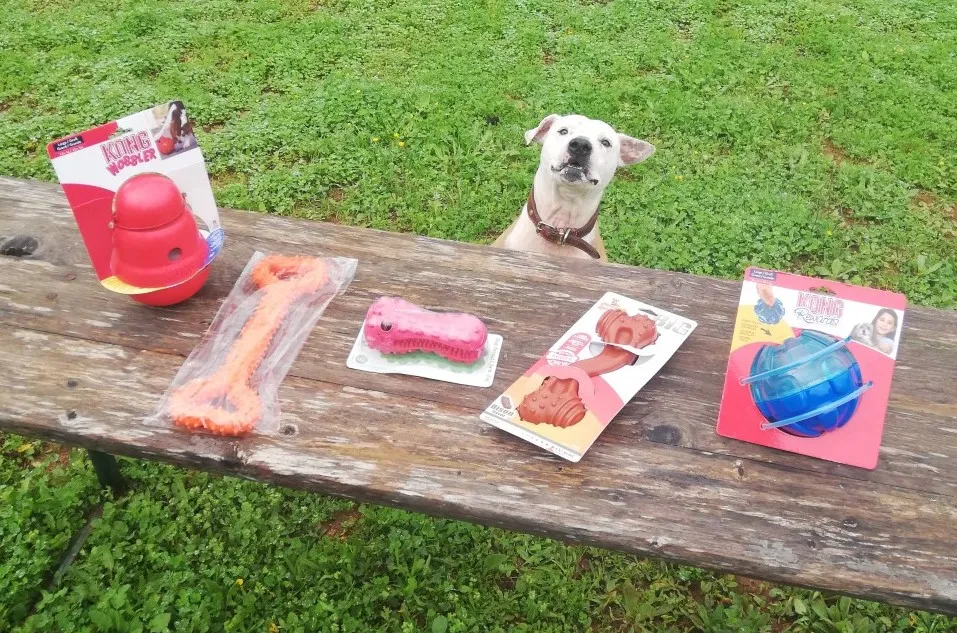 Nylabone Extreme Tough chew toy being tested by a white dogThe Nylabone Extreme Tough Dog Chew Toy, specifically the XXL Bison flavored version, comes with a bold claim: it’s “perfect for the most powerful of chewers” and dogs over 23kg. Our 9-year-old Pit Bull mix, Nero, a dog known for his intelligence and persistent chewing, spent hours with this toy. Despite his best efforts, he barely left a mark. This toy is substantial in size yet surprisingly light, making it easy for dogs to carry around. Its slightly curved design allows for a comfortable grip with paws, enhancing the chewing experience.
Nylabone Extreme Tough chew toy being tested by a white dogThe Nylabone Extreme Tough Dog Chew Toy, specifically the XXL Bison flavored version, comes with a bold claim: it’s “perfect for the most powerful of chewers” and dogs over 23kg. Our 9-year-old Pit Bull mix, Nero, a dog known for his intelligence and persistent chewing, spent hours with this toy. Despite his best efforts, he barely left a mark. This toy is substantial in size yet surprisingly light, making it easy for dogs to carry around. Its slightly curved design allows for a comfortable grip with paws, enhancing the chewing experience.
Even Maya, a 3-year-old dog unaccustomed to toys due to her past, took an immediate liking to the Nylabone. It sparked her interest instantly, and she enjoyed not only chewing it but also playfully running around with it, inviting other dogs like Max to chase her. One significant benefit for humans is how easy it is to keep clean, and best of all, the Nylabone retains its flavor indefinitely without any messy residue or lingering smells.
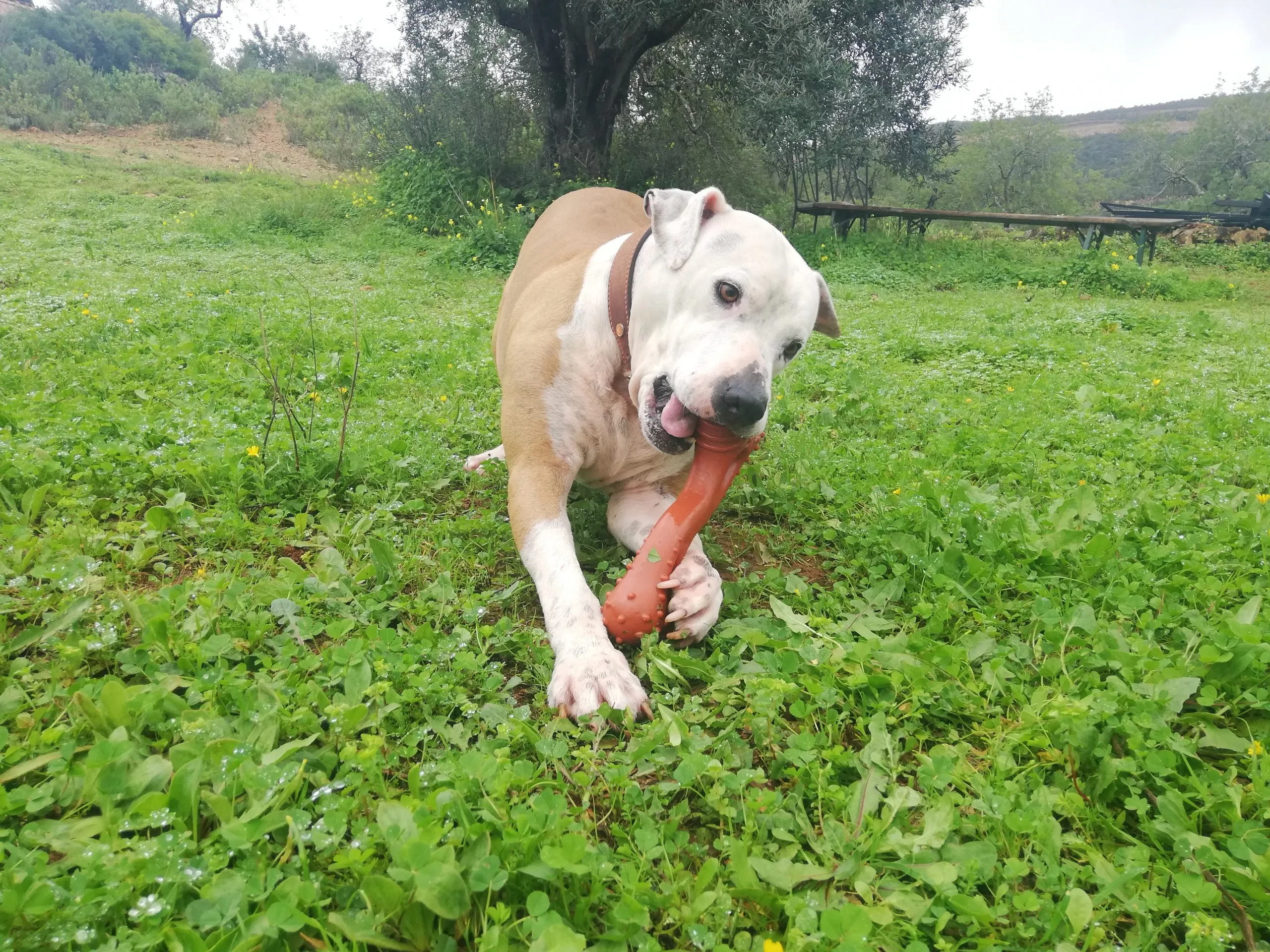 Black and white dog enthusiastically chewing a Nylabone toyBlack Nero, our Cane Corso cross, is the ultimate test for any toy. He’s infamous for his ability to chew through incredibly dense objects, including massive tree trunks, as if they were nothing. When anxious, he’s even managed to bend strong fencing material. Impressively, this Nylabone proved Black Nero-proof. He thoroughly enjoyed it, and after hours of intense chewing, there was hardly a tooth mark on the bone. This toy truly stands out as one of the best indestructible chew toys for Pit Bulls and other strong-jawed breeds.
Black and white dog enthusiastically chewing a Nylabone toyBlack Nero, our Cane Corso cross, is the ultimate test for any toy. He’s infamous for his ability to chew through incredibly dense objects, including massive tree trunks, as if they were nothing. When anxious, he’s even managed to bend strong fencing material. Impressively, this Nylabone proved Black Nero-proof. He thoroughly enjoyed it, and after hours of intense chewing, there was hardly a tooth mark on the bone. This toy truly stands out as one of the best indestructible chew toys for Pit Bulls and other strong-jawed breeds.
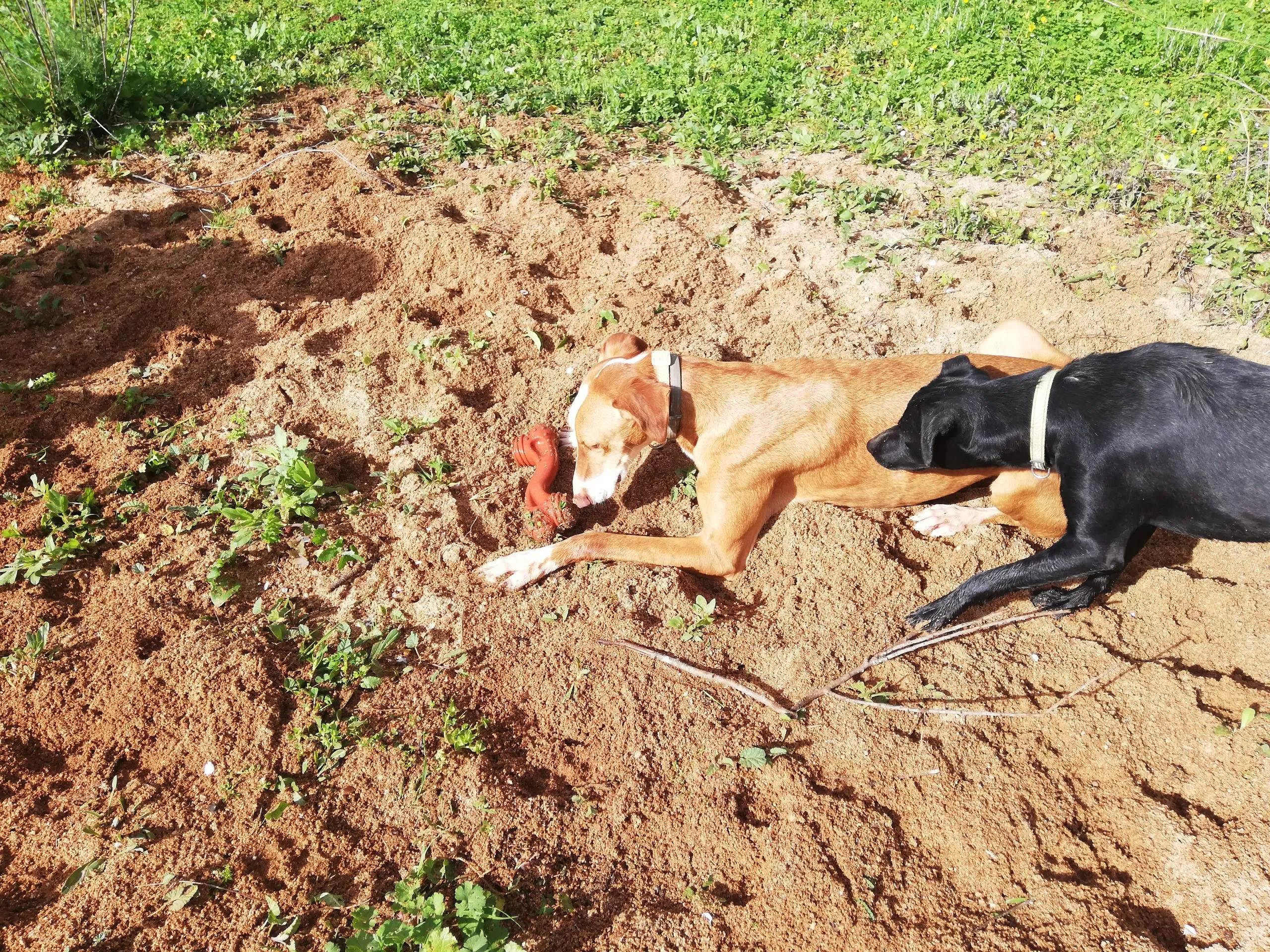 Two dogs, one light-colored and one dark, interacting with a Nylabone chew toy
Two dogs, one light-colored and one dark, interacting with a Nylabone chew toy
The Details:
- Flavor: Bison (also available in chicken and turkey), flavored throughout to encourage chewing.
- Features: Raised nubs to help clean teeth and gums. Safe and non-toxic.
- Measurements: 30.48 x 13.97 x 5.08 cm
- Weight: 485 grams
- Designed for: Dogs 23 kg and above.
Summary:
Every dog at Benafim Shelter wholeheartedly recommends this Nylabone. For owners with dogs that chew everything, get easily bored, and need a truly durable and tasty object to sink their teeth into, this is an outstanding choice.
Kong Rewards Ball
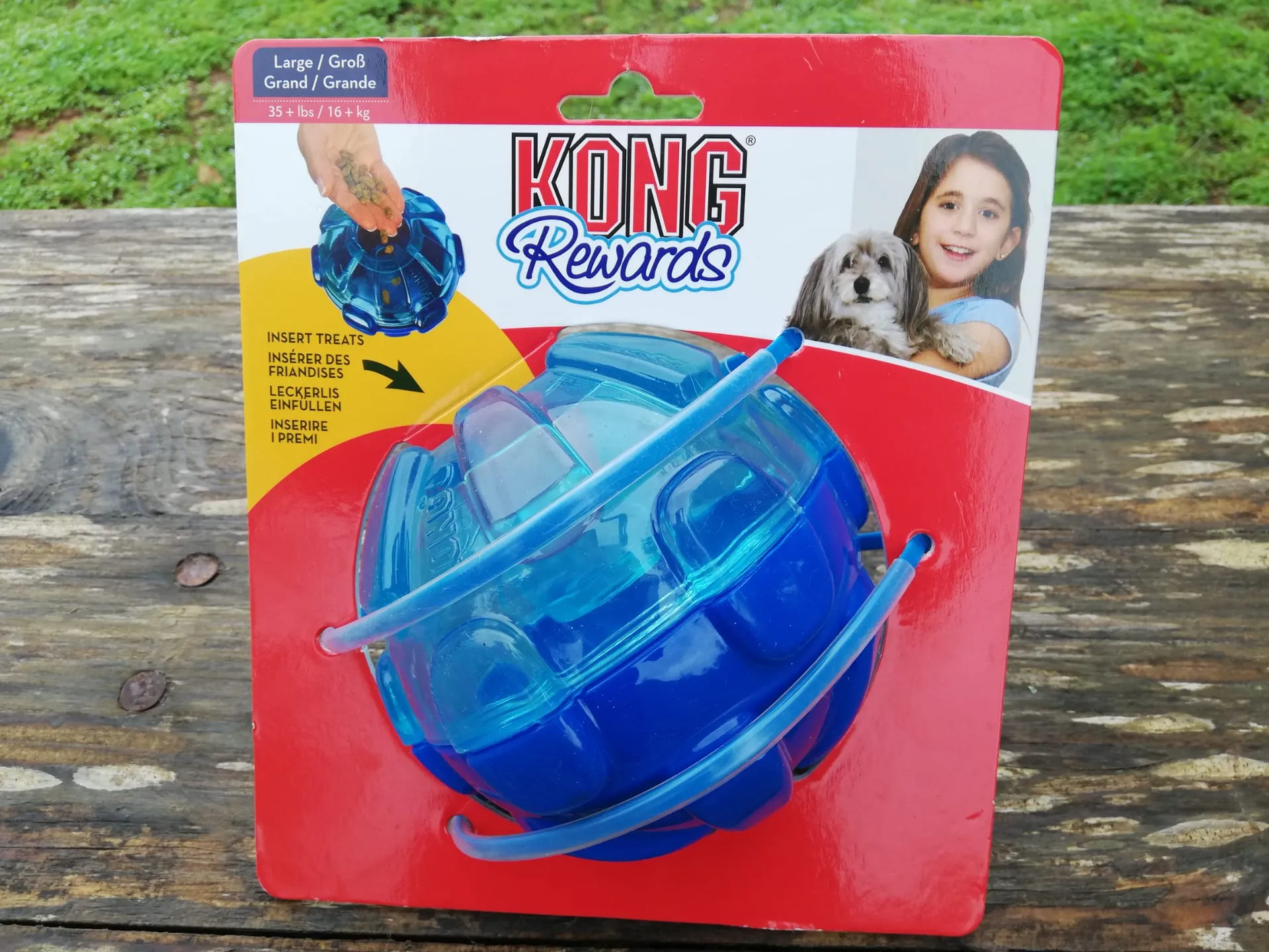 Red Kong Rewards Ball with treats visible, on a grassy surfaceThe Kong Rewards Ball initially received a less enthusiastic reception compared to some other toys, but this was short-lived. The brilliant combination of a play toy and a treat dispenser proved to be a clever concept that kept our dogs amused for hours. From a human perspective, inserting treats was simple, and unlike some other dispensers, it didn’t require excessive effort from the dogs to release their rewards.
Red Kong Rewards Ball with treats visible, on a grassy surfaceThe Kong Rewards Ball initially received a less enthusiastic reception compared to some other toys, but this was short-lived. The brilliant combination of a play toy and a treat dispenser proved to be a clever concept that kept our dogs amused for hours. From a human perspective, inserting treats was simple, and unlike some other dispensers, it didn’t require excessive effort from the dogs to release their rewards.
Interestingly, the dogs seemed to prefer the squishy, bouncy rubber side of the ball for chewing and play more than they focused on the treat-dispensing aspect. Jean, in particular, absolutely adored this toy, repeatedly burying it, chewing the rubbery surface for extended periods, then digging it up again. His best friend Komo barely got a chance to look at it, much to his dismay!
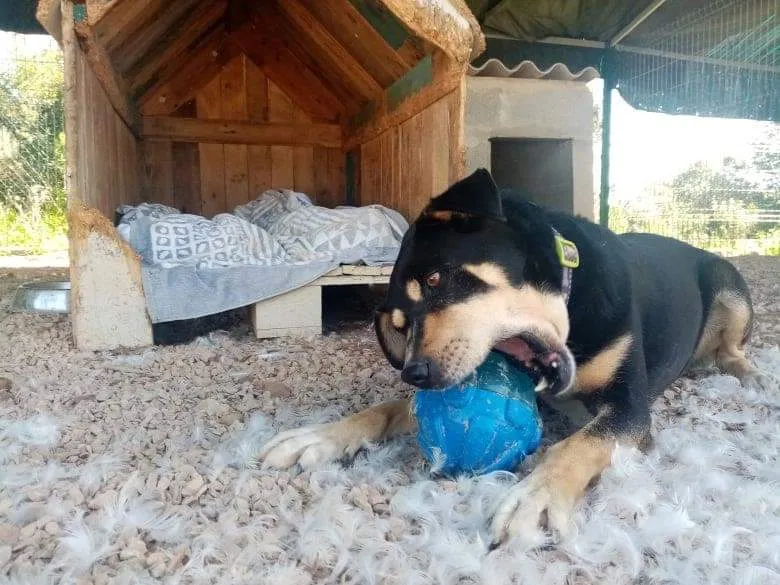 Dog named Jean with a Kong Rewards Ball in its mouth, in a grassy area
Dog named Jean with a Kong Rewards Ball in its mouth, in a grassy area
From the massive Jambo to the petite Star, every dog at the shelter had a turn playing and chewing. Remarkably, not a single tooth mark was found after extensive use, and all treats were successfully retrieved. This is a clear indicator of both its durability and an effective, simple treat dispenser. This robust toy proves to be an excellent option for best chew toys for dogs who love to chew and also enjoy a mental challenge.
The Details:
- Measurements: 12.7 x 12.7 x 12.07 cm
- Weight: 417 Grams
- Designed for: Dogs 16 kg and above.
Summary:
Our dogs consider the Kong Rewards Ball an all-around excellent toy, perfectly blending two of their favorite activities: play and food. It’s a durable and tough toy that withstands significant chewing, bouncing, and interactive play, all while serving as an effective treat dispenser. It’s a great option for dogs that chew everything and need mental stimulation.
CyunCmay Indestructible Dog Toy XL Bone
 Large orange CyunCmay "indestructible" dog bone toyThe CyunCmay XL Bone generated the most initial excitement among our dogs upon unwrapping. However, this excitement was tragically short-lived, especially once Black Nero got his powerful paws and teeth on it. While he undeniably had a blast for about 30 minutes—playing tug-of-war with its handles, enjoying a good chew, and fetching it from the lake—our fears about its “indestructible” claim were quickly realized.
Large orange CyunCmay "indestructible" dog bone toyThe CyunCmay XL Bone generated the most initial excitement among our dogs upon unwrapping. However, this excitement was tragically short-lived, especially once Black Nero got his powerful paws and teeth on it. While he undeniably had a blast for about 30 minutes—playing tug-of-war with its handles, enjoying a good chew, and fetching it from the lake—our fears about its “indestructible” claim were quickly realized.
The toy’s soft, rubbery, and pliable material raised concerns about its ability to withstand the extreme testing our dogs are known for. Nero, sadly, proved us right very swiftly. The material was no match for his chewing power.
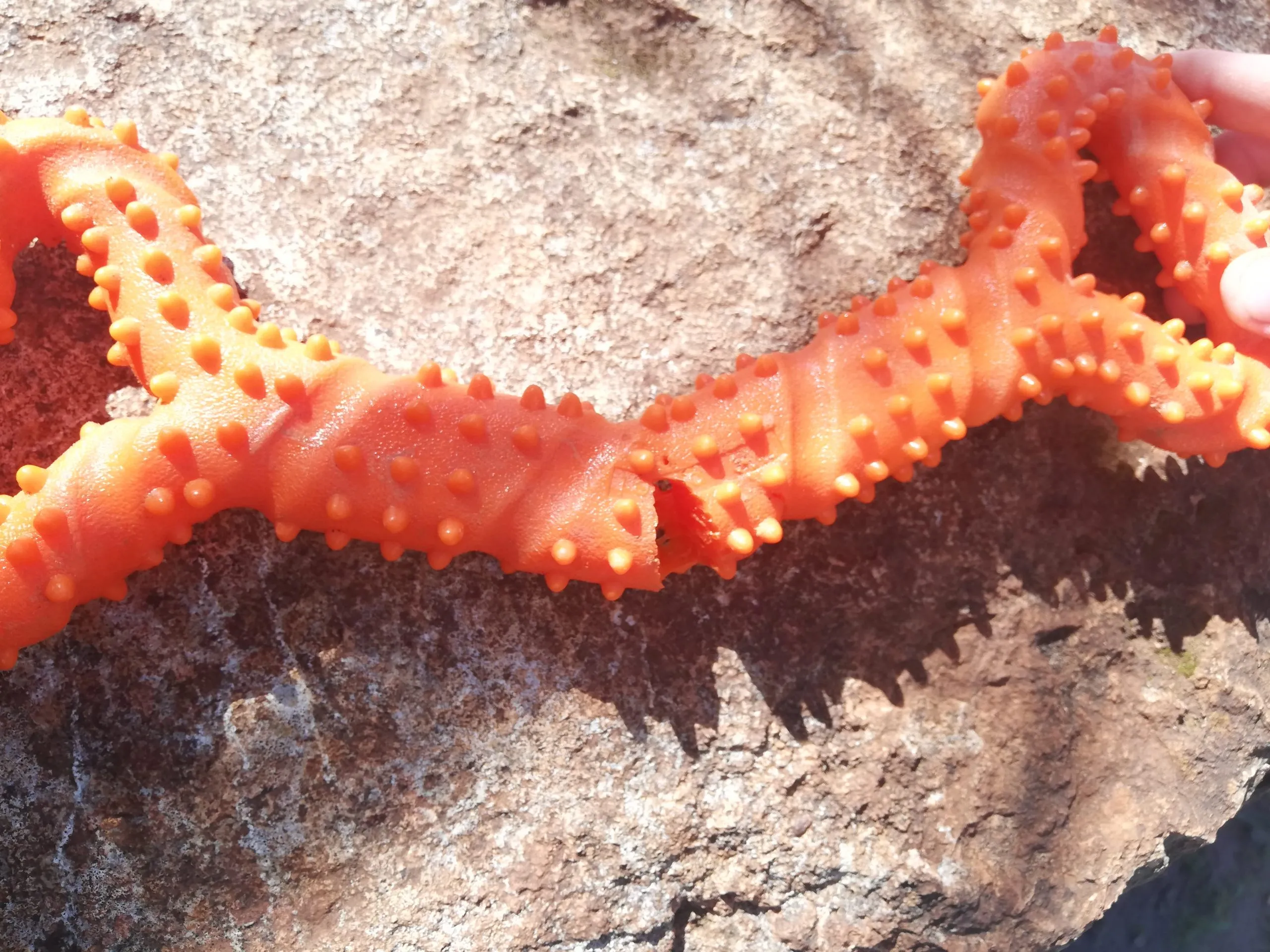 Broken orange dog bone toy with visible teeth marks and a tear
Broken orange dog bone toy with visible teeth marks and a tear
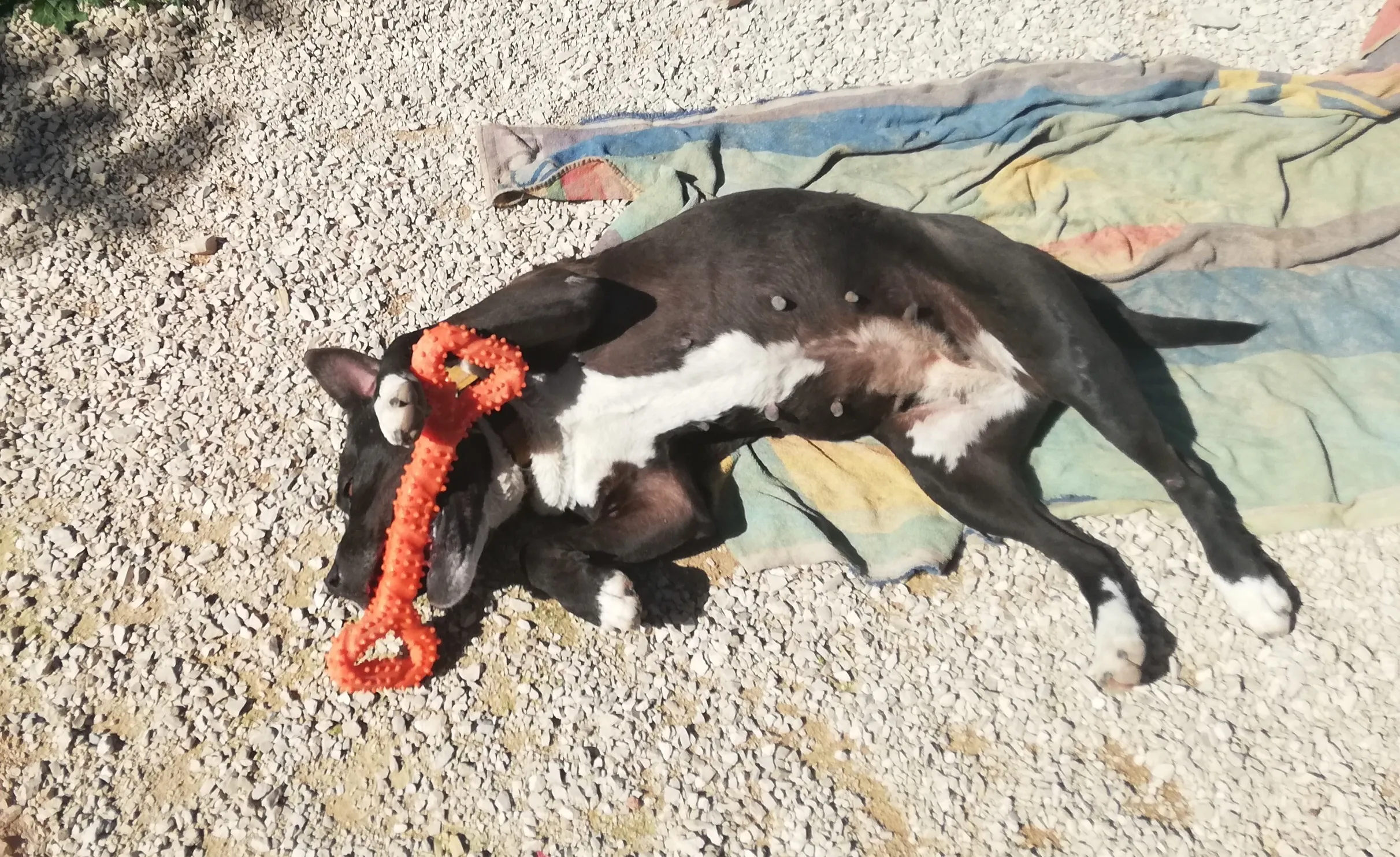 Dog named Pebbles lying down and playing with a large orange bone toy
Dog named Pebbles lying down and playing with a large orange bone toy
The Details:
- Measurements: 32.9 x 12.2 x 3.8 cm
- Weight: 330 Grams
- Material: TPR environmentally friendly material, no chemical smell, safe and non-toxic.
- Features: Surface designed to help clean a dog’s teeth and control plaque and tartar.
Summary:
Despite being advertised as strong, durable, and suitable for medium to large dogs, our dogs’ rigorous testing revealed a different story. “Indestructible”? A resounding no for dogs that chew everything. “Fun for a short while”? Absolutely. If you’re looking for a toy for retrieval games or for lighter chewers, this toy was popular. However, if your dog breaks toys in minutes, this is not the solution. Our shelter dogs were visibly disappointed when their fun with this toy ended so quickly.
HETOO Indestructible Squeaky Dental Care Dog Toy
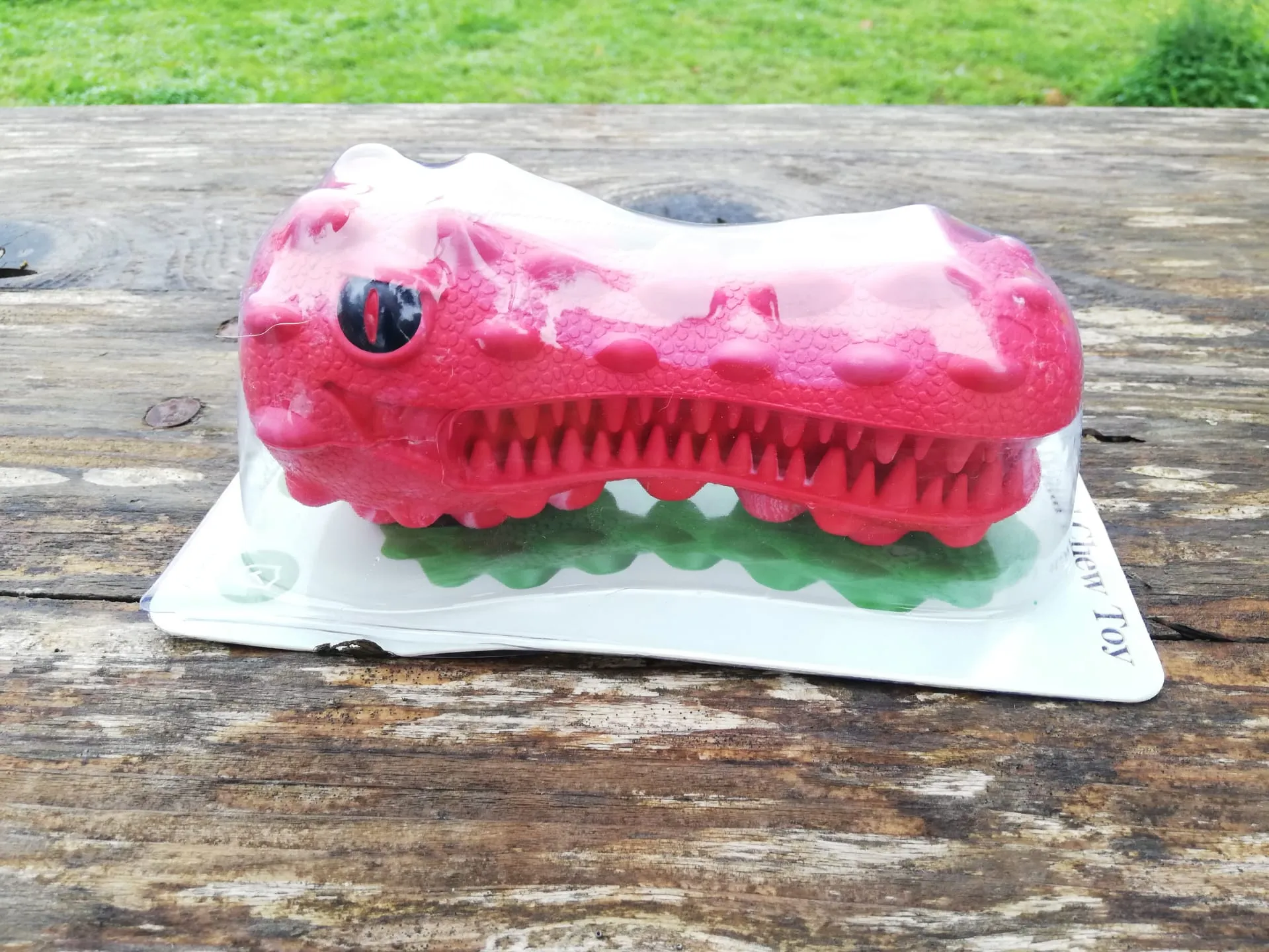 Red HETOO dental cleaning dog toy with bristlesThis HETOO toy is primarily designed for dental care, but it was met with such unenthusiastic responses from our canine reviewers that we were genuinely puzzled. Even its squeak, often a source of excitement, failed to impress. Maya, in particular, ran and hid upon hearing the strange noise from this peculiar-looking red object. Although she bravely returned to inspect it, sustained interest was minimal.
Red HETOO dental cleaning dog toy with bristlesThis HETOO toy is primarily designed for dental care, but it was met with such unenthusiastic responses from our canine reviewers that we were genuinely puzzled. Even its squeak, often a source of excitement, failed to impress. Maya, in particular, ran and hid upon hearing the strange noise from this peculiar-looking red object. Although she bravely returned to inspect it, sustained interest was minimal.
To try and spark more engagement, we smeared peanut butter into the toy’s grooves, hoping to encourage chewing. This tactic held Maya’s interest for a few minutes, but she soon wandered off, leaving the toy behind. This toy is certainly not the ideal choice for dogs that chew everything due to boredom or a need for intense stimulation.
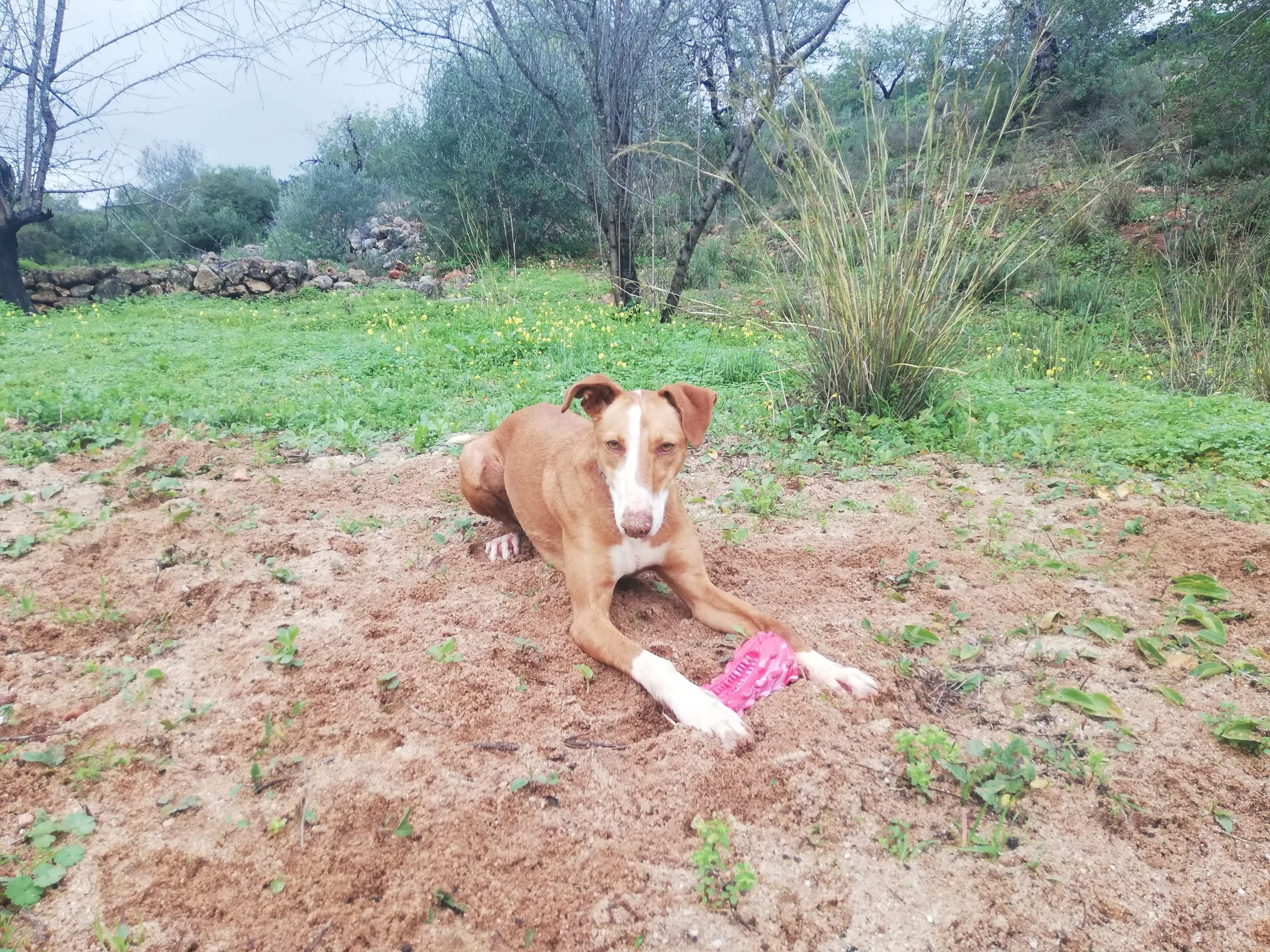 Dog named Maya inspecting a red HETOO dental chew toy
Dog named Maya inspecting a red HETOO dental chew toy
The Details:
- Material: Made from natural rubber.
- Measurements: 12.7 x 12.7 x 12.07 cm
- Weight: 417 Grams
Summary:
The HETOO toy failed to excite our dogs or keep them entertained for more than a few minutes. And yes, it squeaks—annoyingly so for us humans! Black Nero and Maya showed the most interest, but even that was very short-lived. While it offers dental cleaning benefits, its lack of engagement means it’s unlikely to be effective for heavy chewers who need serious stimulation.
Kong Wobbler Interactive Treat Dispensing Dog Toy
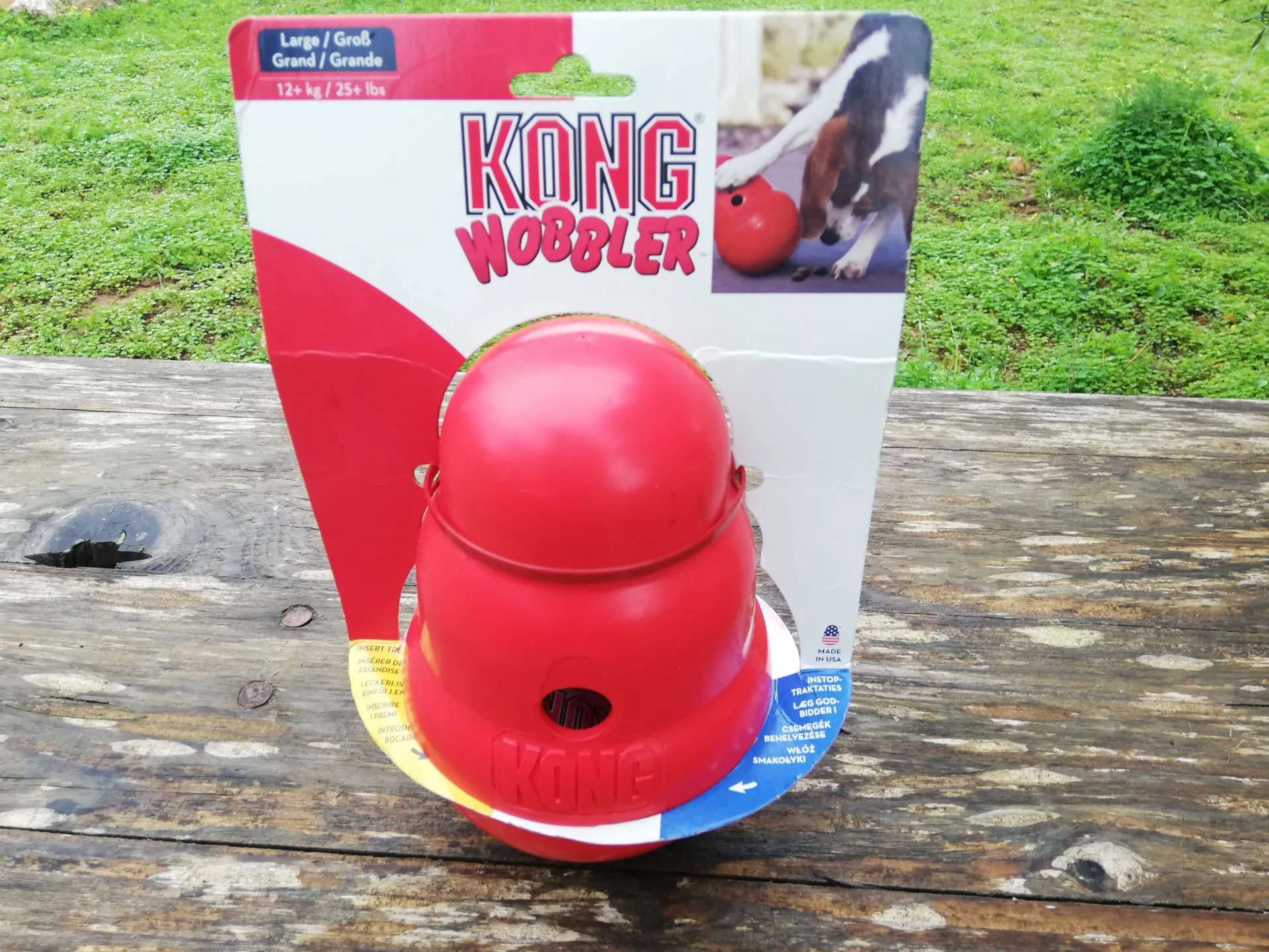 Red Kong Wobbler interactive dog toy on a floorThe Kong Wobbler elicited hilarious reactions from our dogs, initially causing confusion—was it a bird, a plane, a UFO? Its large size likely contributed to this bewilderment. Unlike many other Kong treat toys made from rubber, this Wobbler is constructed from a harder plastic polymer. From a human perspective, its twist-off lid makes filling it with treats straightforward. However, our dog “experts” initially struggled. They understood treats were inside and wanted to play, but couldn’t quite figure out how to get them out (except for Killo, who was utterly perplexed by the wobbly red object).
Red Kong Wobbler interactive dog toy on a floorThe Kong Wobbler elicited hilarious reactions from our dogs, initially causing confusion—was it a bird, a plane, a UFO? Its large size likely contributed to this bewilderment. Unlike many other Kong treat toys made from rubber, this Wobbler is constructed from a harder plastic polymer. From a human perspective, its twist-off lid makes filling it with treats straightforward. However, our dog “experts” initially struggled. They understood treats were inside and wanted to play, but couldn’t quite figure out how to get them out (except for Killo, who was utterly perplexed by the wobbly red object).
It took us humans a moment to realize that the Kong Wobbler performs best on smooth surfaces, not the pebbly stone ground of the kennels, and that the treat size must be compatible with the dispenser hole—a classic “Doh!” moment. This interactive toy is excellent for mental enrichment and can keep intelligent dogs engaged for extended periods, especially those who might otherwise resort to chewing out of boredom.
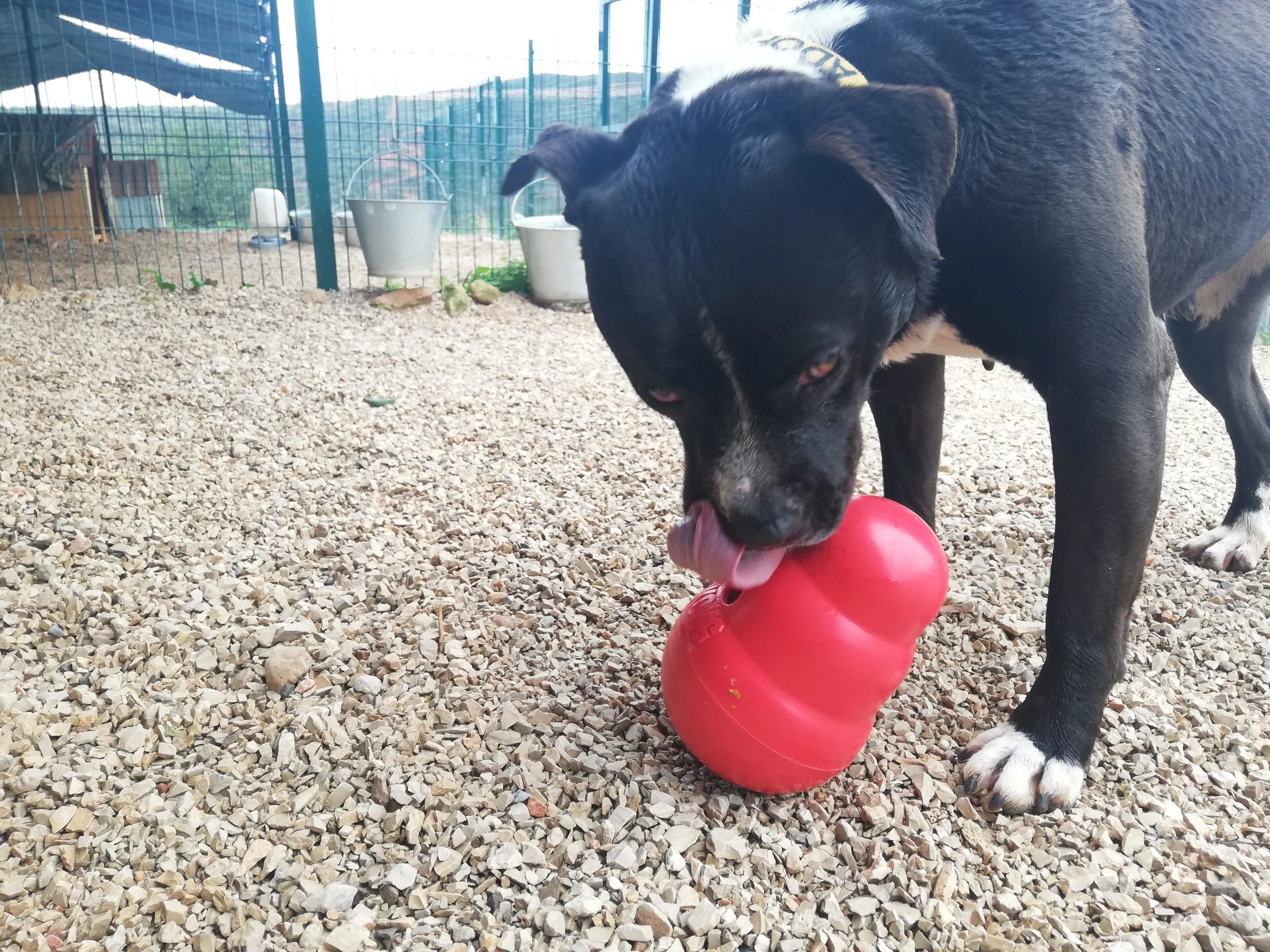 Dog named Pebbles interacting with a red Kong Wobbler treat dispensing toy
Dog named Pebbles interacting with a red Kong Wobbler treat dispensing toy
The Details:
- Material: Made from a Plastic polymer.
- Measurements: Diameter 13 x 19 cm.
- Weight: 485 grams.
- Designed for: Dogs 12 kg plus.
- Maximum Filling Capacity: 250 grams.
Summary:
Once the dogs (and humans!) understood how the Kong Wobbler worked, and that it required a smooth surface to function optimally, it was a huge hit. Its large size makes it challenging for dogs to pick up and chew directly, which ironically contributes to its durability against destructive chewers. Is it “indestructible”? For its intended purpose, yes, according to our dogs. Is it easy to use? Yes, once the humans ensure appropriately sized treats are used. This toy excels as a mental enrichment tool, proving its worth even for dogs that chew everything, by offering a constructive way to burn energy. For those interested in best soft chew toys for dogs, this is not the choice, as it’s designed for durability and mental challenge.
Our Top Recommendations for Dogs That Chew Everything
After a week of rigorous, paws-on testing by our Benafim Shelter experts, we’ve reached a clear verdict on which toys genuinely stand up to the challenge of dogs that chew everything.
While the term “indestructible” is often an overstatement, some toys prove to be remarkably tough and long-lasting, providing both entertainment and a safe outlet for powerful chewers.
Based on our intensive review, the top contenders that truly impressed us for their durability and engaging qualities are:
- Nylabone Extreme Tough Dog Chew Toy: This toy emerged as the undisputed champion for pure chewing power. Its exceptional durability, long-lasting flavor, and dental benefits make it an absolute must-have for extreme chewers. It withstood the most powerful jaws, including Black Nero’s, without showing significant wear.
- Kong Rewards Ball: While not a traditional “chew-only” toy, its robust rubber construction held up impressively to chewing attempts, and its dual function as a treat dispenser provides excellent mental and physical stimulation. It’s a fantastic option for interactive play combined with durability.
- Kong Wobbler Interactive Treat Dispensing Dog Toy: Another outstanding choice for mental enrichment and durability. Its hard plastic polymer construction proved virtually immune to our dogs’ attempts to chew it apart. It’s perfect for slowing down eating and providing a challenging puzzle, effectively channeling a dog’s energy away from destructive chewing.
Investing in high-quality, durable chew toys for dogs that chew everything is crucial for their safety, dental health, and overall well-being. These toys provide a positive outlet for natural chewing instincts, preventing boredom and potential damage to your home.
Conclusion
Finding the perfect chew toy for a dog that seems to destroy everything can be a significant challenge, but it’s not an impossible one. Our comprehensive, real-world testing at Benafim Dog Shelter has shown that while few toys are truly “indestructible,” certain products stand head and shoulders above the rest in terms of durability and effectiveness for even the most aggressive chewers.
The Nylabone Extreme Tough Dog Chew Toy, Kong Rewards Ball, and Kong Wobbler all demonstrated exceptional resilience and provided valuable enrichment for our shelter dogs. When selecting a toy for your power chewer, always consider their size, chewing style, and the toy’s material. Prioritizing safety and durability will ensure that your dog has a long-lasting, satisfying chewing experience.
For more insights into canine care and to discover other products that truly make a difference, explore additional articles on Dog Care Story!
